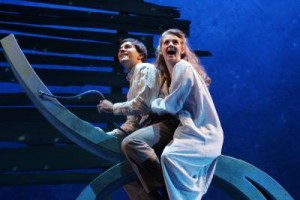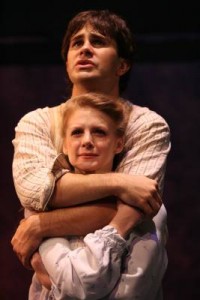RECOMMENDED
It is 1920 and the night before Mary’s wedding. Dreams take her back several years to the night of a thunderstorm, the night when the young Englishwoman first set eyes on Charlie, a strapping young Canadian farmer and horseman, and the love of her life.
Canadian playwright Stephen Massicotte’s Mary’s Wedding, currently in its Los Angeles premiere at the Colony Theatre, is a story of love in the time of war, in this case The Great War, a war fought in trenches across bloody European fields, a war that killed over 20,000,000 and destroyed even more lives. As Mary’s Wedding unfolds, we see its effect on Mary and Charlie, and on the wedding which is about to take place.
The Colony Production is blessed by the performances of two excellent young actors and the work of one of the finest design teams around. The play has moments great power and beauty. There are, however, surreal stretches where I’m sorry to say Massicotte’s writing left me cold.
Mary’s dream recalls first love’s bloom, their first horseback ride together, and Mary’s mother’s opposition to their love. Later, war clouds darken over Europe, and Charlie, caught up in his patriotism, enlists, despite Mary’s objections. Letters back to Canada describe the horrors of war and the bravery of his fellow soldiers. In her dream, Mary is in the trenches with Charlie, becoming his troop leader Sergeant Flowerdew, a.k.a. Flowers. Scenes move back and forth in time. At one minute, Charlie is facing death, surrounded by gunfire, at the next, he is with Mary, in the verdant Canadian fields. Both Charlie and Mary address the audience, though the tale is mostly told by her and through her eyes.
Director David Rose has a long history with the Colony Theatre going back for me to the very first production I saw as a Colony subscriber, 1993’s You Can’t Take It With You. As he did in last season’s Master Harold … and the boys (named by StageSceneLA Best of 2007-8 in six separate categories, including Outstanding Direction of a Drama), Rose once again proves himself an actor’s director. Working with Ashley Bell and Brett Ryback, his work here is once again superb.
Bell first caught my eye as Abigail, the vindictive seductress in Arthur Miller’s The Crucible, a role whose intensity made her the perfect choice to play it. In The Voice Of The Prairie, earlier this year at the Colony, Bell demonstrated her talents at playing a number of different roles in a single play. The role of Mary thus suits Bell to a T. Passion lights up her eyes as Mary relives her love story with Charlie, a dream which moves from magical to nightmarish in a heartbeat. Massicotte’s script also has Bell incarnate troop leader Flowers, Norfolk accent and all, and to make quick transitions between Mary and the sergeant, which she does to perfection.
Ryback’s Charlie is such a handsome, salt-of-the earth guy that it’s easy to see why Mary would fall head over heals from their first meeting amidst flashes of lighting and booms of thunder, echoing the booms of cannons to follow. Young Ryback is truly a Renaissance man—composer, playwright, pianist, singer, actor. Here, he shows us all of Charlie’s charm and naïve optimism, put to the test as he faces death in the bloody cavalry charge in the Battle of Moreuil Wood.
Mary’s Wedding benefits enormously from the contributions of its design team, most notably David Potts (scenic design), Jeremy Pivnick (lighting design), and Cricket S. Myers (sound design). Potts’ set clearly places us in a dream, a suggestion of high barn walls sketched out behind a grassy, flower strewn stage on which a large geometric figure represents a horse (a frequent participant in the action, both in Charlie’s home town and on the battlefields of France). Pivnick’s lighting once again demonstrates the designer’s brilliant mastery of his craft. Rain falls in sheets, lightning illuminates the sky, as do streaks of red in the battle scenes. Myers’ sound design surrounds us with thunder and wind and artillery fire. A. Jeffrey Shoenberg designed the play’s two costumes, a cotton nightgown for Mary and a small town boy’s long-sleeved shirt, suspenders, and trousers for Charlie.
The production is so beautifully staged and acted that I wish Massicotte’s script had been more completely to my liking. I tend to favor more linear stories, which this most definitely is not, and much as I marvel at Bell’s talent at going back and forth from Mary to Flowers in her dream, I’m not a big fan of this type of this particular conceit by a playwright.
By play’s end, however Massicotte had me completely in the palm of his hand, and the play’s final minutes, and the realization of what the play’s title signifies for Mary, moved me deeply.
Ultimately, despite the play’s surreal passages, which are a matter of taste, there is much to savor in Mary’s Wedding.
Colony Theatre, 555 North Third Street, Burbank.
www.colonytheatre.org
–Steven Stanley
October 25, 2008
Photos: Michael Lamont




 Since 2007, Steven Stanley's StageSceneLA.com has spotlighted the best in Southern California theater via reviews, interviews, and its annual StageSceneLA Scenies.
Since 2007, Steven Stanley's StageSceneLA.com has spotlighted the best in Southern California theater via reviews, interviews, and its annual StageSceneLA Scenies.







 COPYRIGHT 2024 STEVEN STANLEY :: DESIGN BY
COPYRIGHT 2024 STEVEN STANLEY :: DESIGN BY